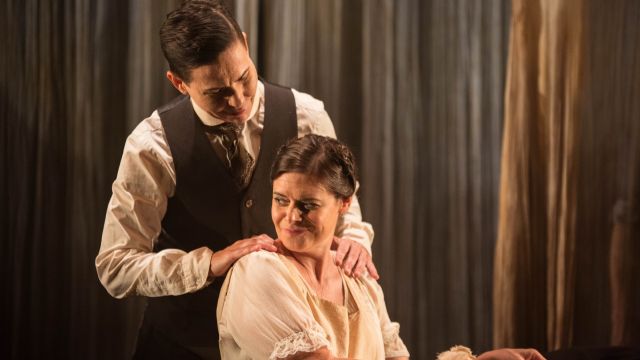The Trouble With Harry
Lachlan Philpot continues to make theatre that cuts edges in both style and subject matter. In this play, based on the story of Harry Crawford (born Eugenia Falleni, also known as Eugene Falleni and Jean Ford) a female-to-male transgender man convicted in 1920 of the murder of his first wife, Annie Birkett, Philpott imagines the complexities of sustaining such a secret and the constant threat of what exposure might bring.
Based obviously on a wealth of historical data – records of the court case itself, which included statements by Crawford’s daughter and stepson, press stories that sensationalised the case, and subsequent biographies –Philpott re-creates a family trying desperately to be ‘normal’, but dogged by rumour and innuendo. He does this in a play where energy and pace are demanded by the combination of styles – narrative comment, realistic scenes, telling soliloquies – and the concise, succinct dialogue.
His writing is tight, yet the characters are clearly defined. Scenes are interspersed and interrupted by two suburban voyeurs, a man and a woman whose comments, as neighbours, passers-by, underline the gossip and interference spawned by the close proximity inner-city living after the first World War.
 Kate Gaul’s direction is as tight as the writing. She sets a fast pace and the scenes connect and interconnect quickly and smoothly, exposing the characters and all their insecurities, flaws and fears. This is streamlined by Alice Morgan’s simple but effective set, a square, upraised platform of wooden planks, reached by steps at each corner, and lit (lighting design by Matt Cox) from underneath for some scenes. Transluscent drapes frame the back of the space, allowing some interesting shadow effects.
Kate Gaul’s direction is as tight as the writing. She sets a fast pace and the scenes connect and interconnect quickly and smoothly, exposing the characters and all their insecurities, flaws and fears. This is streamlined by Alice Morgan’s simple but effective set, a square, upraised platform of wooden planks, reached by steps at each corner, and lit (lighting design by Matt Cox) from underneath for some scenes. Transluscent drapes frame the back of the space, allowing some interesting shadow effects.
Jodie Le Vesconte takes on the daunting role of Harry Crawford with focused skill, finding the many dimensions of the character and the depth of self-control and inner strength that was needed to sustain the life he had to live. Nonchalant indifference covers wired concentration and constant wariness. Only in a few, brief, personal moments is the real strain betrayed.
Annie Birkett is played by Jane Phegan, who finds the strength based on both love and fear that Philpott has imagined for this character. Constantly moving from one rented space to another, Phegan’s Annie is relentlessly watchful, persistently on guard. She has her son to protect, her dignity to uphold, normality to maintain in an environment that is suspicious and spiteful.
 Jonas Thomson plays her son Harry Birkett with the naive curiosity and innocence of the young. He moves from awkward hesitancy, to artless confidence, to bemused confusion in a performance that is very appealing.
Jonas Thomson plays her son Harry Birkett with the naive curiosity and innocence of the young. He moves from awkward hesitancy, to artless confidence, to bemused confusion in a performance that is very appealing.
Harry’s daughter, Josephine Falleni, is played with shrewd insight by Bobbie-Jean Henning. She finds all the angry resentment of this spurned teenager in arrogant flounces and bitter accusations, but shows also the vulnerability and apprehension that underlies her brittleness.
The ‘voyeur-narrators’ are played with excellent timing and purpose by Thomas Campbell-Man and Niki Owen. Both sustain the tempo and concentration necessitated by their changes in character and the frequency of their comments and interruptions. Their roles are essential to set the context of the play as they background Philpott’s intuitive perception of the times and how they dictated the choices the young Falleni was forced to make and sustain.
Carol Wimmer
Photographer: Clare Hawley
Subscribe to our E-Newsletter, buy our latest print edition or find a Performing Arts book at Book Nook.

